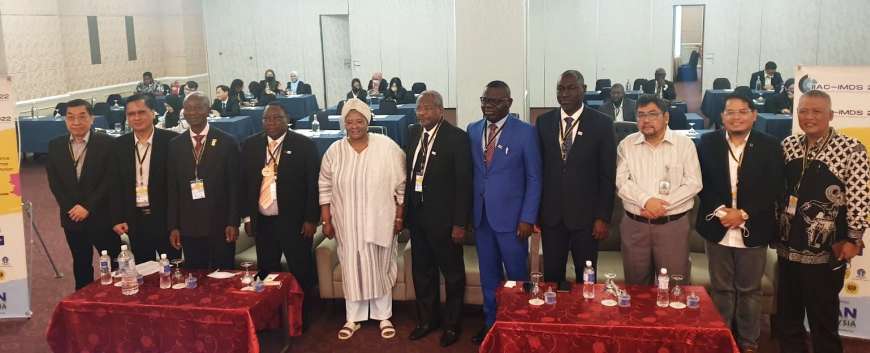- Posted by Khafi Mubegi
- 19 May 2022
- INTERNASIONAL
- Total View 0
UT’s Vice Rector II, the Key-Note Speaker in IIAC-ICAF-IMDS Conference in Malaysia
Vice Rector for Finance and General Affairs of Universitas Terbuka (Warek II UT), Prof. Dr. Ali Muktiyanto, S.E., M.Si. was present as the guest of honor and speaker as well as the delegate of the 4th ICAN-Malaysia International Accountants’ Conference (IIAC-IMDS) conference and the 4th ICAN Malaysia International Conference on Accounting and Finance (ICAF-IMDS) which was organized from 16 to 19 May 2022 in Langkawi, Malaysia. The invitation was presented by the Assistant Professor of Forensic Accounting and Financial Criminology of Universiti Utara Malaysia., Asst. Prof. Dr. Oluwatoyin Muse Johnson Popoola, JP, PhD, MBA, FCTI, CFA, RPA, AM(M), FCA as the Chairman of Malaysia District Society & Conference Board IIAC-ICAF IMDS Langkawi 2022. The invitation as the guest speaker was served to UT’s Vice Rector II as he is one expert that has personally been working directly on economics and finance in UT.
In such opportunity, Prof. Ali, his nickname, explained the materials on “The Governance Transformation of Open and Distance Learning (ODL) University in the Digital Era”. After presenting the trend on the reform of the university governance both in the world and in Indonesia, including its relevance with the theory of agency and the theory of contingency. He also conveyed the importance of the transformation of university governance, especially in university by using Open and Distance Learning System so that it can be independent, agile, and up-to-date, in line with the perspective Model of Boer et. al. (2008).

The materials presented draw a lot of attention of many academicians and practitioners as in his presentation, Prof. Ali stated, “In terms of university governance, there should be synchronized interest and roles among the state/government, academicians, stakeholders, management, and the market so that the university would be able to perform superbly. In this digital era, Open and Distance University must be agile to adapt with the on-going and developing context. The transformation of the governance structure of the Work Unit or Satuan Kerja (SATKER) is purely under the supervision of Ministry of Education Culture Research and Technology (Kemdikbudristek), which is to become Higher Education Institution as Legal Entity State University (PTN BH) or Perguruan Tinggi Negeri Berbadan Hukum (PTN-BH); it is one form of the implementation of the Theory of Agency and the Theory of Contingency so that Open and Distance Higher Education Institution is more relevant in the digital era and boost itself as flexible and democratic higher education institution”.
Currently, Universitas Terbuka (UT) is in the process of functional transformation from the Work Unit of Higher Education Institution as Public Service Agency (PTN BLU) or Higher Education Institution as Legal Entity State University (PTN BH), in order to obtain more extensive autonomy. This is in line with the ideas presented by Prof. Ali that more extensive autonomy of the university would be able to perform optimally and actively in responding the challenges in the era full of volatility, uncertainty, complexity, and ambiguity (VUCA).
Additionally, it is also conveyed that in terms of strategic management, the use of information system technology has also become a significant factor in the transformation of UT’s governance. At present, UT is developing integrated financial management information system governance research and development starting from planning, implementation up to financial accountability. It is expected that this information system may be able to respond the challenge in this VUCA era, with more accelerated, accurate, and efficient business process so that it will support the objectivity of the decision making by the management.
The IIAC-ICAF-IMDS’ conference on “BUILDING ECONOMIC RESILIENCE: NAVIGATING TURBULENT TIMES THROUGH DIGITAL TRANSFORMATION”, involved a number of experts and speakers who presented their ideas, opinions, as well as experiences regarding the relevance of technology on business activities and the human existence during the Covid-19 pandemic.






